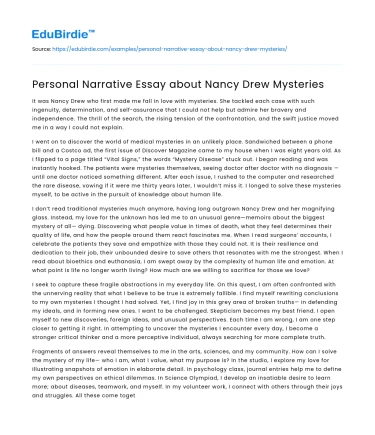It was Nancy Drew who first made me fall in love with mysteries. She tackled each case with such ingenuity, determination, and self-assurance that I could not help but admire her bravery and independence. The thrill of the search, the rising tension of the confrontation, and the swift justice moved me in a way I could not explain.
I went on to discover the world of medical mysteries in an unlikely place. Sandwiched between a phone bill and a Costco ad, the first issue of Discover Magazine came to my house when I was eight years old. As I flipped to a page titled “Vital Signs,” the words “Mystery Disease” stuck out. I began reading and was instantly hooked. The patients were mysteries themselves, seeing doctor after doctor with no diagnosis — until one doctor noticed something different. After each issue, I rushed to the computer and researched the rare disease, vowing if it were me thirty years later, I wouldn’t miss it. I longed to solve these mysteries myself, to be active in the pursuit of knowledge about human life.
Save your time!
We can take care of your essay
- Proper editing and formatting
- Free revision, title page, and bibliography
- Flexible prices and money-back guarantee
I don’t read traditional mysteries much anymore, having long outgrown Nancy Drew and her magnifying glass. Instead, my love for the unknown has led me to an unusual genre—memoirs about the biggest mystery of all— dying. Discovering what people value in times of death, what they feel determines their quality of life, and how the people around them react fascinates me. When I read surgeons’ accounts, I celebrate the patients they save and empathize with those they could not. It is their resilience and dedication to their job, their unbounded desire to save others that resonates with me the strongest. When I read about bioethics and euthanasia, I am swept away by the complexity of human life and emotion. At what point is life no longer worth living? How much are we willing to sacrifice for those we love?
I seek to capture these fragile abstractions in my everyday life. On this quest, I am often confronted with the unnerving reality that what I believe to be true is extremely fallible. I find myself rewriting conclusions to my own mysteries I thought I had solved. Yet, I find joy in this grey area of broken truths— in defending my ideals, and in forming new ones. I want to be challenged. Skepticism becomes my best friend. I open myself to new discoveries, foreign ideas, and unusual perspectives. Each time I am wrong, I am one step closer to getting it right. In attempting to uncover the mysteries I encounter every day, I become a stronger critical thinker and a more perceptive individual, always searching for more complete truth.
Fragments of answers reveal themselves to me in the arts, sciences, and my community. How can I solve the mystery of my life— who I am, what I value, what my purpose is? In the studio, I explore my love for illustrating snapshots of emotion in elaborate detail. In psychology class, journal entries help me to define my own perspectives on ethical dilemmas. In Science Olympiad, I develop an insatiable desire to learn more; about diseases, teamwork, and myself. In my volunteer work, I connect with others through their joys and struggles. All these come together to uncover my mystery, but the last piece is missing.
I think back to the Discover article I read all those years ago, noting the relief and closure the patients must have felt, and the answer has never been more clear. Medicine is my opportunity to help others solve their mysteries while pursuing my desire to learn more about human life. With the idea that my knowledge might someday affect others, I am constantly motivated to continue searching for answers.
Every day, I look for chances to channel my inner Nancy Drew. To search for clues—and to close the case.






 Stuck on your essay?
Stuck on your essay?

